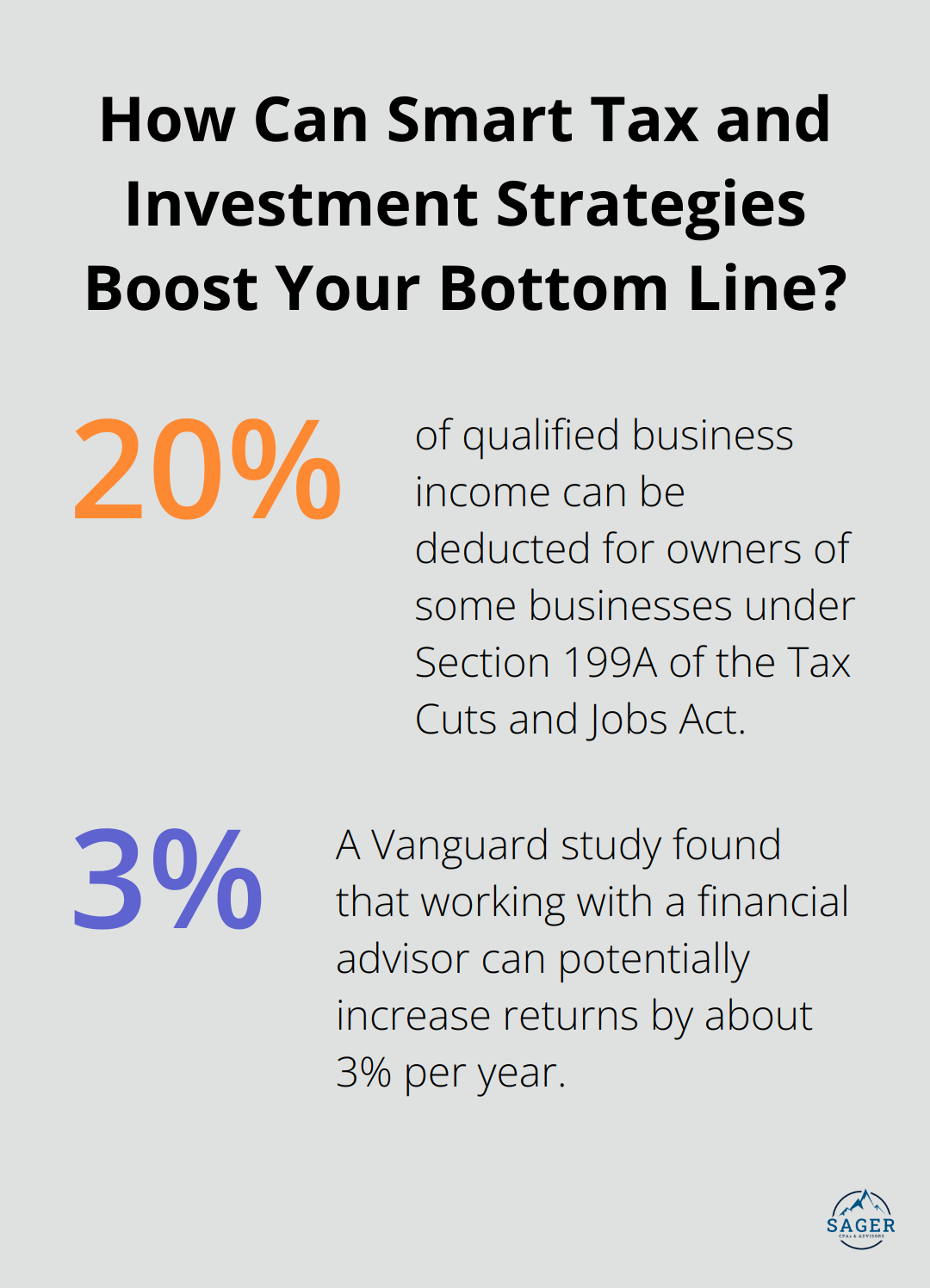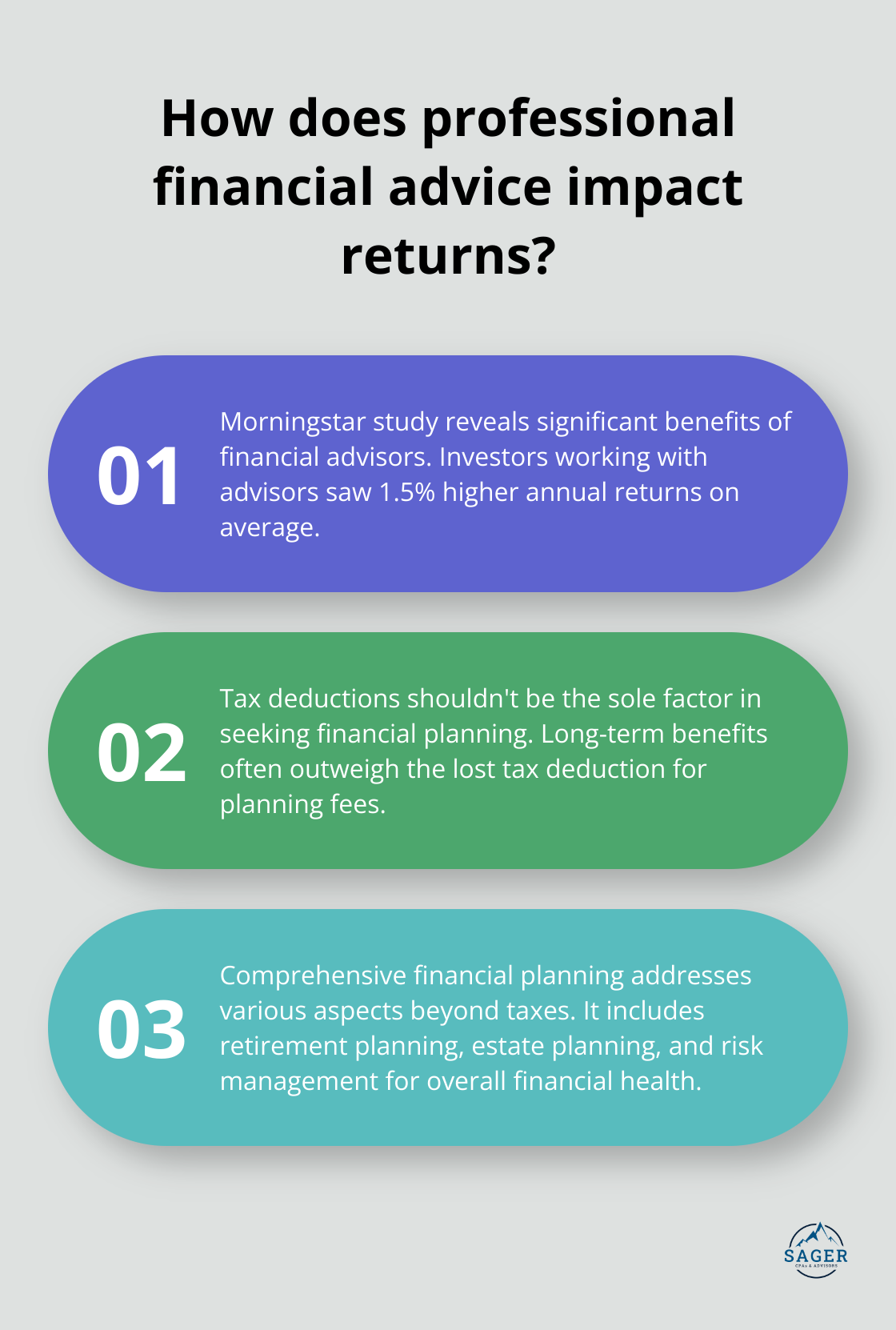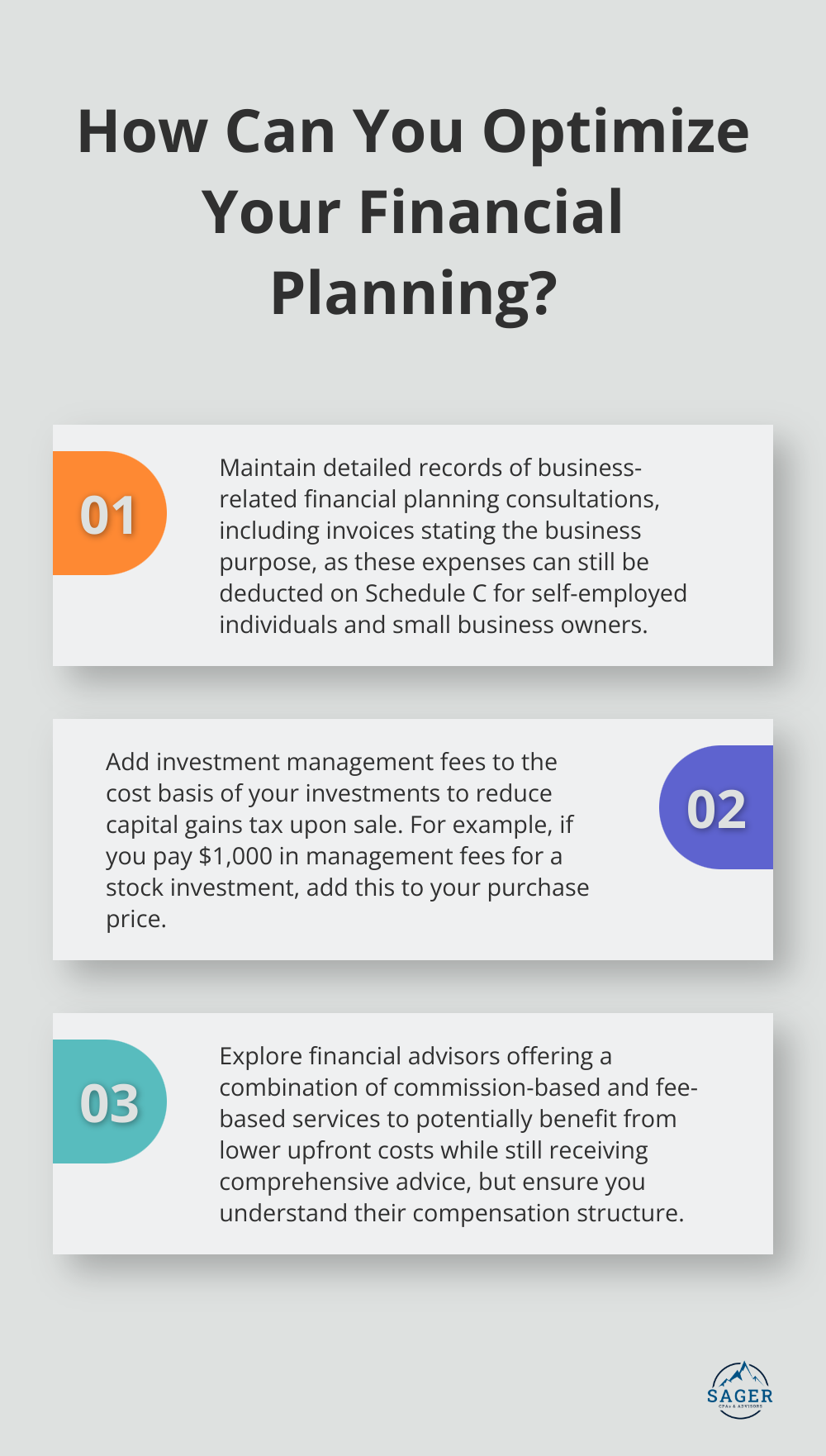
At Sager CPA, we often get asked about the tax implications of financial planning fees. Many people wonder if financial planning advice is tax deductible.
The answer isn’t always straightforward, as it depends on various factors and specific circumstances. In this post, we’ll explore the rules surrounding the tax deductibility of financial planning fees and provide insights to help you make informed decisions.
Financial planning advice is a comprehensive service that helps individuals and businesses manage their finances effectively. It creates a roadmap for achieving financial goals, such as saving for retirement, buying a home, or growing a business.
Financial planning services encompass various areas:
A financial planner might help you create a budget that allows you to save more for retirement while meeting your current financial obligations.
A survey by the Certified Financial Planner Board of Standards examined American millennials’ life and financial goals, providing insights into their financial planning needs.
A financial planner acts as your personal financial coach. They analyze your current financial situation, understand your goals, and develop strategies to help you reach those goals. For instance, if you plan to start a business, a financial planner can help you understand the financial implications and create a plan to manage your personal and business finances effectively.
Professional financial advice can significantly impact your financial well-being. Vanguard’s research on Advisor’s Alpha outlines how financial advisors can add value through relationship-based services.

Moreover, financial planners can help you navigate complex financial situations. If you’re going through a major life change (such as getting married or starting a new job), a financial planner can help you understand how these changes affect your finances and adjust your financial plan accordingly.
Financial planning is not just about numbers-it’s about helping you achieve your life goals. Professional advisors take the time to understand your unique situation and provide personalized advice that aligns with your objectives. Whether you want to optimize your tax strategy or plan for retirement, expert guidance can prove invaluable every step of the way.
Now that we understand what financial planning advice entails, let’s explore the tax implications of these services and whether they are tax-deductible.
The Tax Cuts and Jobs Act (TCJA) of 2017 significantly altered the tax deductibility of financial planning fees. This new provision, also known as Section 199A, allows a deduction of up to 20% of qualified business income for owners of some businesses, with certain limitations. As of 2024, most individuals can no longer deduct these expenses on their tax returns.
Prior to 2018, taxpayers could deduct financial planning fees as miscellaneous itemized deductions if they exceeded 2% of their adjusted gross income. The TCJA eliminated this deduction for tax years 2018 through 2025, fundamentally changing the financial planning landscape.
While the general rule states that financial planning fees are not deductible, some exceptions exist:
Although financial planning fees are generally not deductible, certain investment-related expenses may still qualify for favorable tax treatment. Fees paid for the management of taxable investments can be added to the cost basis of investments, potentially reducing capital gains tax upon sale.

The American Institute of CPAs (AICPA) emphasizes the importance of proper documentation for these expenses. Maintaining detailed records of all investment-related fees is essential (and can save you headaches during tax season).
The TCJA provisions are set to expire after 2025, which could potentially reinstate the deductibility of financial planning fees. However, this change is not guaranteed and would require action from Congress.
Despite the current non-deductibility of fees, professional financial advice continues to offer significant value. A Vanguard study found that working with a financial advisor can potentially increase returns by about 3% per year (a benefit that often outweighs the non-deductibility of fees).
As we move forward, it’s clear that the value of financial planning extends far beyond tax considerations. In the next section, we’ll explore strategies to maximize the benefits of financial planning, even in the current tax environment.
Self-employed individuals and small business owners can still deduct financial planning fees directly related to their business operations. These expenses typically appear on Schedule C of your tax return. For example, consultations about structuring business finances or planning for expansion qualify as deductible expenses. Maintain detailed records of these consultations, including invoices that clearly state the business purpose of the advice.
While direct deduction of financial planning fees is no longer possible, you can still benefit from careful management of investment-related expenses. Add fees paid for managing taxable investments to the cost basis of your investments. This strategy reduces your capital gains tax when you sell the investment. For instance, if you pay $1,000 in management fees for a stock investment, add this to your purchase price to reduce your taxable gain upon sale.
Some financial advisors adapt their fee structures in response to tax law changes. They now offer a combination of commission-based and fee-based services. This approach potentially benefits you with lower upfront costs while still providing comprehensive advice. However, you must understand how your advisor receives compensation to ensure their recommendations align with your best interests.
Tax deductions should not be the sole factor in deciding whether to seek financial planning advice. The long-term benefits of professional guidance often outweigh the lost tax deduction. A Morningstar study found that investors who worked with a financial advisor saw an average of 1.5% higher returns annually compared to those who managed their own investments. Over time, this difference can amount to significant wealth accumulation.
Financial planning extends beyond tax considerations. A comprehensive approach addresses various aspects of your financial life, including retirement planning, estate planning, and risk management. These services provide value that transcends immediate tax benefits. For example, proper estate planning can save your heirs significant taxes in the future (even if the planning fees themselves are not deductible).

Financial planning advice is not tax-deductible for most individuals due to the Tax Cuts and Jobs Act of 2017. This change has impacted the financial planning landscape, but it hasn’t reduced the value of professional guidance. Tax considerations shouldn’t be the only factor when deciding to seek financial planning advice.

The rules for tax deductibility of financial planning fees are complex and may change. Some aspects of financial planning might still be tax-deductible for business owners and self-employed individuals (with proper documentation). We at Sager CPA offer expert financial management and tax planning services tailored for individuals and businesses.
Professional financial advice helps create comprehensive strategies for long-term financial goals. It provides a clear financial roadmap and peace of mind, which often outweigh the loss of tax deductibility. The benefits of sound financial planning can exceed any tax advantages, positioning you for a more secure and prosperous financial future.




Privacy Policy | Terms and Conditions | Powered by Cajabra
At Sager CPAs & Advisors, we understand that you want a partner and an advocate who will provide you with proactive solutions and ideas.
The problem is you may feel uncertain, overwhelmed, or disorganized about the future of your business or wealth accumulation.
We believe that even the most successful business owners can benefit from professional financial advice and guidance, and everyone deserves to understand their financial situation.
Understanding finances and running a successful business takes time, education, and sometimes the help of professionals. It’s okay not to know everything from the start.
This is why we are passionate about taking time with our clients year round to listen, work through solutions, and provide proactive guidance so that you feel heard, valued, and understood by a team of experts who are invested in your success.
Here’s how we do it:
Schedule a consultation today. And, in the meantime, download our free guide, “5 Conversations You Should Be Having With Your CPA” to understand how tax planning and business strategy both save and make you money.